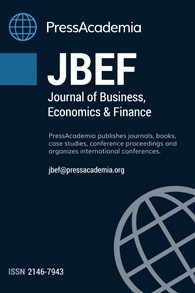EFFECTS OF INDUSTRY 4.0 ON MARKETING STRATEGIES, AN APPLICATION ON TURKISH AUTOMOBILE INDUSTRY: A RESEARCH AMONG AUTO EXECUTIVES IN TURKEY
Purpose - The study investigates the effects of Industry 4.0 on automobile marketing strategy in Turkey. It attempts to show whether a significant relationship among Industry 4.0 and market growth and cost reduction of auto brands in Turkey via IoT (Internet of Things). Methodology – The study employed 37 automobile brands as sample from Turkey. 61 participants have responded the questionnaire. The research method utilized in the study was analyzed by sampling using the questionnaire as a data collection tool. Findings - First, supported a summary of Industry 4.0 and auto marketing, it was found out the conception and behavior changes in several sorts of automobile brands, awakening stakeholders to the transforming forces that are reshaping their business and organization. Second, these quite reshaping organization changes marketing strategy deeply. The usage rate of digital channels has increased positively in automobile marketing strategies. Third, the usage rate of one-to-one marketing has increased positively in automobile marketing. And, the number of dealerships has affected negatively such a way that transforming sales points to delivery points. It is understood that government policies and sales points have a significant effect on market size. Conclusion - The study contains valuable information and managerial implications for marketing professionals who want to implement different marketing strategies in the enlightening of Industry 4.0. First, supported a summary of Industry 4.0 and automobile marketing, it was found out the conception and behavior changes in several sorts of automobile brands, awakening stakeholders to the transforming forces that are reshaping their business and organization. Second, these quite reshaping organization changes marketing strategy deeply.
Keywords:
Industry 4.0, marketing strategies, automobile marketing IoT, auto brands,
___
- Dominici, G., Roblek, V., Abbate, T., & Tani, M. (2016), “Click and drive”: Consumer attitude to product development. Towards future transformations of driving experience. Business Process Management Journal, 22, 420-434. doi:10.1108/BPMJ-05- 2015-0076
- I-Scoop (2020). How the Internet of Things impacts marketing, http://www.i-scoop.eu/how-the-internet-of-things-impacts- marketing/ IBM (2015). Redefining Boundaries: Insights from the Global C.
- Fernández-Caramés, T. M., Fraga-Lamas, P. (2018). A review on human-centered IoT-connected smart labels for the industry 4.0. IEEE Access, 6, 25939-25957.
- Kagermann, H., Wahlster, W., and Helbig, J., (2013), Recommendations for implementing the strategic initiative Industrie 4.0 – Final report of the Industrie 4.0 Working Group. Communication Promoters Group of the Industry-Science Research Alliance. Frankfurt am Main: Acatech.
- Kuang, Xu & Zhao, Fuquan & Hao, Han & Liu, Zongwei. (2017), Intelligent connected vehicles: the industrial practices and impacts on automotive value-chains in China. Asia Pacific Business Review. 1-21. 10.1080/13602381.2017.1340178
- Lasi, H., Fettke, P., Kemper, H. G., Feld, T., & Hoffmann, M. (2014), Industry 4.0. Business & Information Systems Engineering, 6, 239-242. doi:10.1007/s12599-014-0334-4.
- Lin D., Lee C., (2018), Strategic response to Industry 4.0: an empirical investigation on the Chinese automotive industry “, Industrial Management & Data Systems Vol. 118 No. 3, pp. 589-605.
- Maduku, D.K., Mpinganjira, M. and Duh, H. (2016), “Understanding mobile marketing adoption intention by South African SMEs: a multi-perspective framework”, International Journal of Information Management, Vol. 36 No. 5, pp. 711-723.
- Saldanha, T. and Krishnan, M.S. (2012), “Organizational adoption of Web 2.0 technologies: an empirical analysis”, Journal of Organizational Computing and Electronic Commerce, Vol. 22 No. 4, pp. 301-333.
- Sekaran, Uma and Bougie R. (2011), Research Methods for Business, Fifth Edition, John Wiley & Sons Ltd
- Tornatzky, L. G., Fleischer, M., & Chakrabarti, A. K. (1990). Processes of technological innovation. Lexington books.
- Roblek, V., Meško, M., Krapez, A. ( 2016), A Complex View of Industry 4.0, SAGE Open, April-June, 1–11.
- Schwab, K. (2016). World Economic Forum. https://www.weforum.org/agenda/2016/01/the-fourth-industrial-revolution-what-it-means-and-how-to-respond/
- Wook Ok, M. (2018). Use of iPad as assistive technology for students with disabilities. TechTrends, 62(1), 95-102.
- World Economic Forum (2015). Deep Shift – Technology Tipping Points and Societal Impact, Survey Report, Global Agenda Council on the Future of Software and Society, September 2015
- Yayın Aralığı: Yılda 4 Sayı
- Başlangıç: 2012
- Yayıncı: PressAcademia
